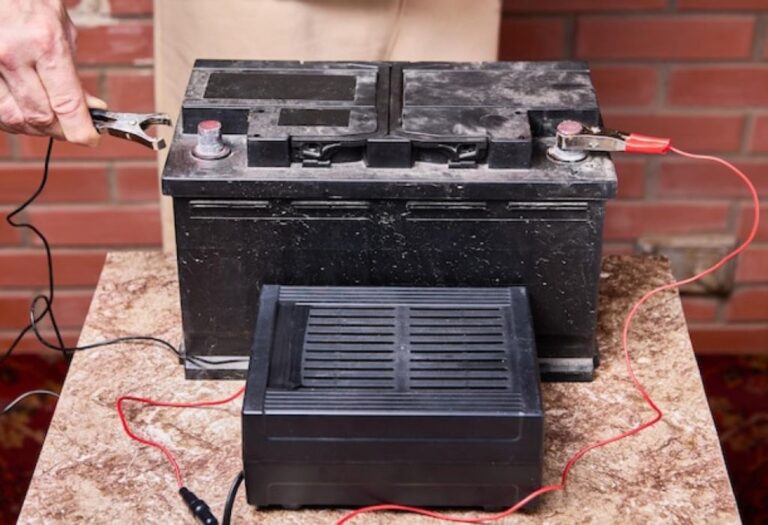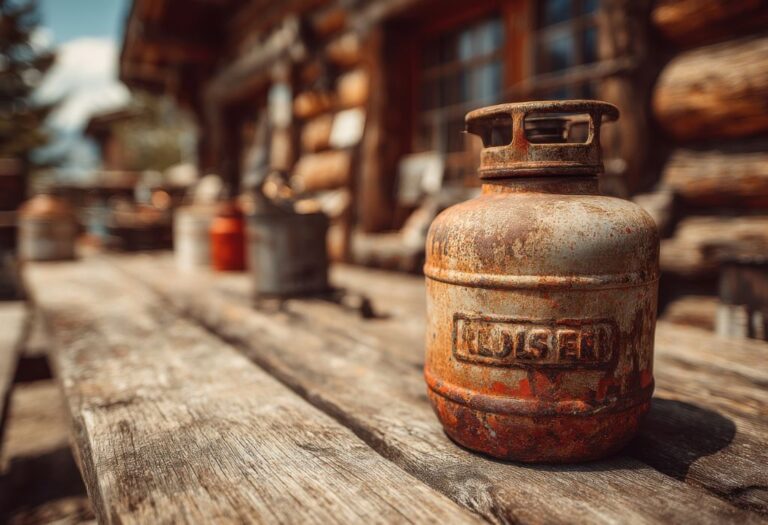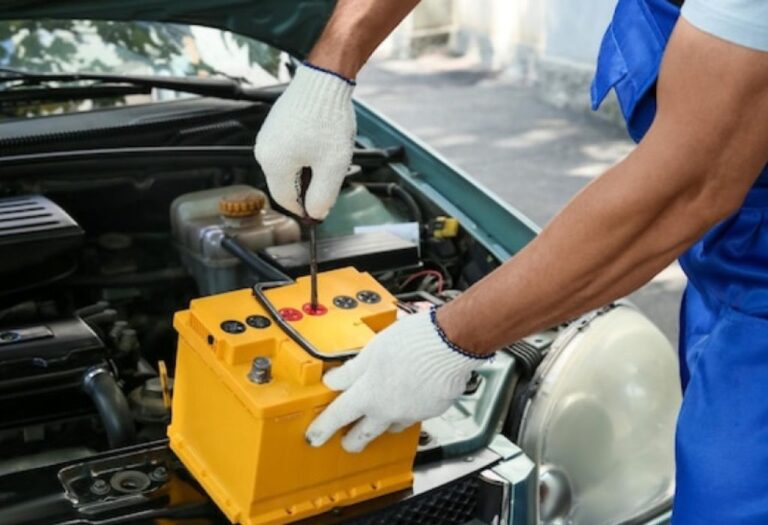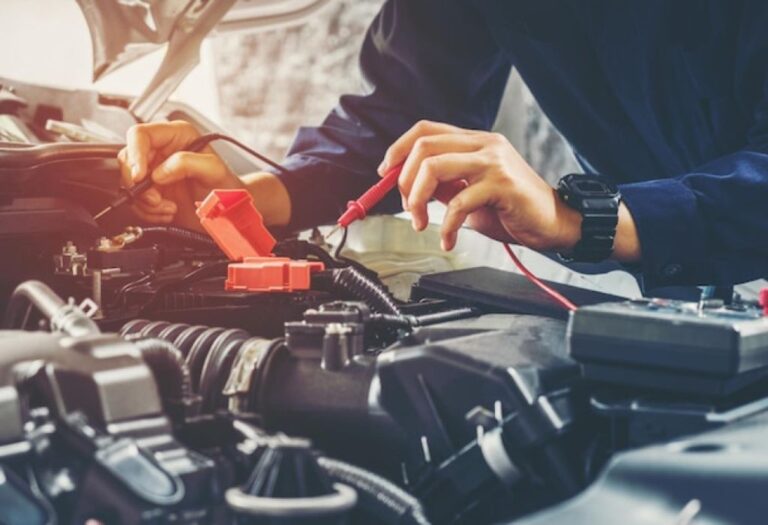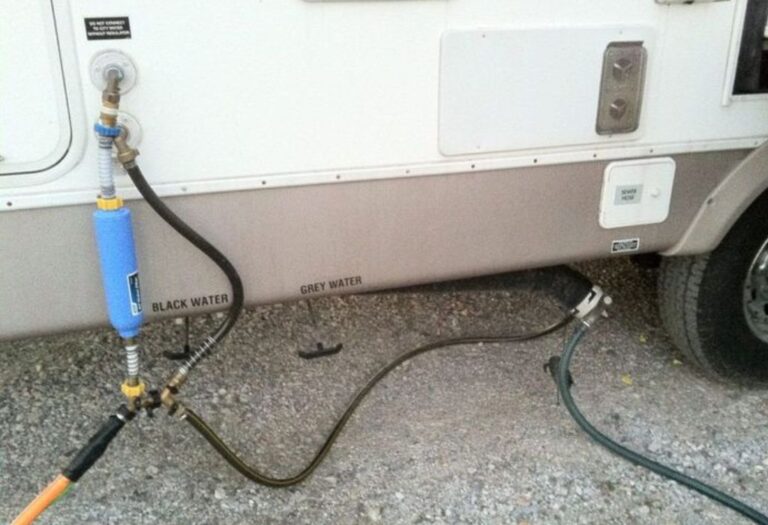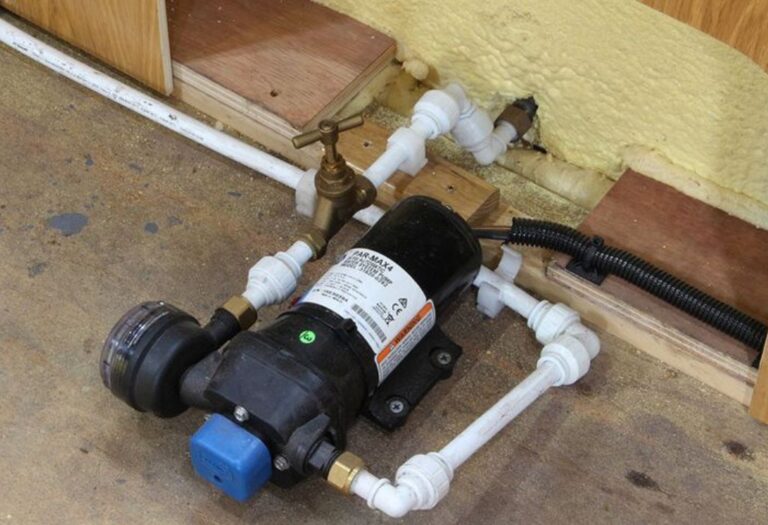Why Are RV Water Pumps So Noisy? Causes and Solutions Explained
The sudden whirring or rattling of a water pump can quickly disrupt a peaceful RV trip. Many RV owners report waking up in the middle of the night to loud humming sounds, wondering if their pump is broken. Noisy water pumps are among the most common complaints, often interrupting quiet mornings or evening relaxation.
Imagine filling your freshwater tank while the RV vibrates with each pump cycle. The issue isn’t always the pump itself—air trapped in hoses, loose fittings, or worn components can amplify sound. Understanding why RV water pumps become noisy is the first step toward a smooth and stress-free journey.
Noise in an RV water pump is more than an annoyance. Continuous vibrations can strain plumbing lines, damage connections, and shorten the motor’s lifespan. Studies indicate that vibration-induced damage contributes to nearly 30% of premature RV water pump failures.
Fortunately, most causes of noisy RV pumps are solvable. From adjusting pressure switches to installing anti-vibration mounts, simple strategies can significantly reduce sound. This guide explores RV water pump mechanics, common causes of noise, practical fixes, and long-term maintenance tips for a quieter travel experience.
How RV Water Pumps Work
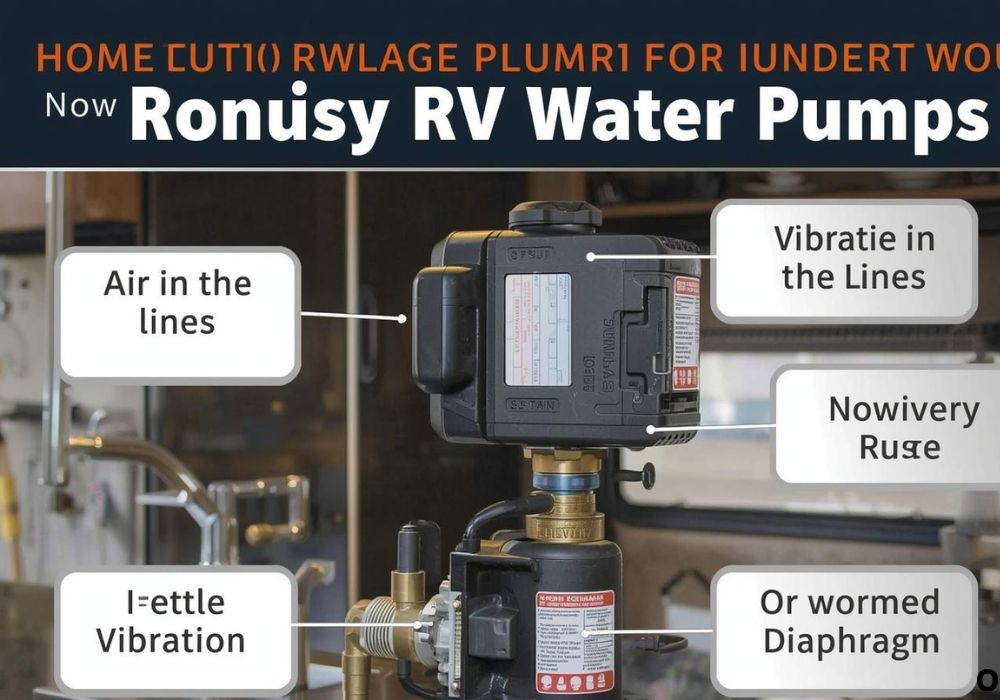
RV water pumps are designed to move water from the onboard freshwater tank to faucets, showers, and toilets. Understanding their operation helps identify noise sources and apply effective solutions.
Types of RV Water Pumps
- Diaphragm Pumps: The most common type, using a flexible diaphragm to maintain steady pressure. They are reliable but can become noisy if components wear.
- Centrifugal Pumps: Less common; use impellers to circulate water. Quieter at low pressures but can struggle under high demand.
- Brand-Specific Pumps: Popular models such as Shurflo and Flojet vary in flow rates and noise profiles. Choosing the right pump affects overall sound levels.
Common Noise Mechanisms
- Vibration: Pump motion transmits vibrations to the RV structure, amplifying sound.
- Cavitation: Air bubbles in water create popping or rattling noises.
- Motor Strain: Worn motor parts or electrical issues increase humming, whining, or buzzing.
Pump Installation Factors
- Correct mounting orientation and anti-vibration supports reduce transmitted noise.
- Proper hose routing prevents kinks or bends that amplify vibrations.
- Placement relative to water tank and fixtures affects pressure and sound.
Common Causes of Noisy RV Water Pumps
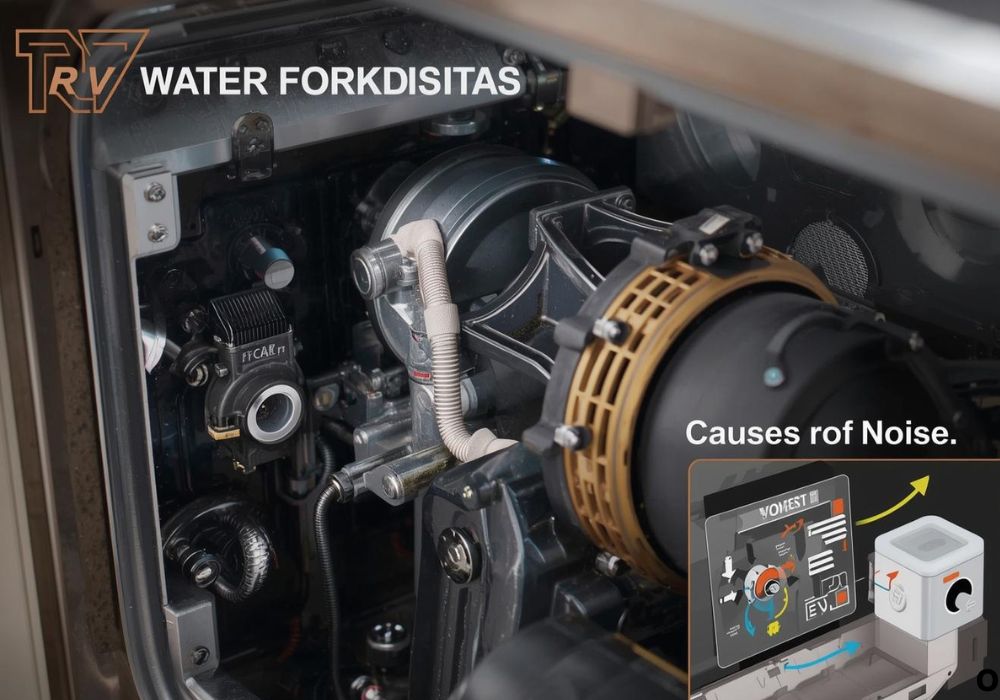
Noisy pumps stem from mechanical, electrical, or installation issues. Diagnosing the root cause ensures effective fixes.
Air in the System
Air trapped in hoses or pump chambers is a major source of noise.
- Symptoms: Sputtering faucets, inconsistent water flow, rapid humming.
- Solutions: Bleed air by opening all faucets and running the pump until flow stabilizes. Inspect hoses for leaks and ensure they are fully filled.
- Prevention: Keep tank filled properly, avoid introducing air when refilling, and routinely check fittings.
Worn or Loose Components
Over time, diaphragms, mounting screws, or bearings wear, increasing vibration.
- Signs: Rattling, uneven sound, water surges, sudden pressure drops.
- Solutions: Inspect components, tighten screws, replace worn diaphragms or valves, secure fittings.
- Prevention: Routine maintenance every 6–12 months.
High Water Pressure or Flow Restrictions
Pressure switches misaligned or clogged filters make pumps work harder, producing noise.
- Symptoms: Humming under load, abrupt starts/stops, pulsating flow.
- Solutions: Adjust pressure switches, clean or replace filters, ensure hoses are kink-free.
- Prevention: Check pressure readings regularly; maintain filters and hoses.
Electrical Issues
Low voltage, weak batteries, or poor wiring strain the pump motor, creating noise.
- Symptoms: Humming that intensifies under load or intermittent stops.
- Solutions: Verify voltage supply, maintain battery health, secure wiring connections.
- Prevention: Monitor battery levels and replace old batteries.
Solutions to Reduce RV Water Pump Noise
Implementing multiple strategies can minimize or eliminate noise.
Proper Installation Tips
- Use anti-vibration mounts or rubber grommets.
- Secure hoses and fittings with clamps.
- Ensure the pump is on a stable, level surface away from sensitive cabin areas.
Maintenance and Replacement
- Replace worn diaphragms, check valves, and bearings promptly.
- Clean strainers, inline filters, and hoses regularly.
- Lubricate moving parts if recommended by the manufacturer.
Pressure and Flow Adjustments
- Calibrate pressure switches for optimal performance.
- Use flow restrictors to prevent surges and pulsations.
- Maintain consistent water pressure to reduce vibration and motor strain.
Using Noise-Reduction Accessories
- Pump mufflers and sound blankets absorb vibrations.
- Foam padding or enclosures isolate the pump from the cabin.
- Combining multiple techniques achieves maximum noise reduction.
Understanding Water Hammer in RVs
Water hammer is a sudden pressure spike that produces banging or knocking sounds.
- Causes: Rapid valve closure, high water flow, or long pipe runs.
- Effects: Amplifies pump noise, stresses plumbing fittings, and can damage valves.
- Solutions: Install water hammer arrestors, use soft-close valves, and reduce pump pressure surges.
- Prevention: Gradually open and close faucets; maintain proper hose diameter.
Upgrading to a Smart Quiet Pump
Modern quiet RV pumps reduce vibrations and noise while maintaining flow.
- Features: Variable speed control, silent diaphragm technology, built-in mufflers.
- Benefits: Less vibration, extended pump lifespan, energy efficiency.
- Installation: Follow manufacturer instructions; may require electrical adjustments.
DIY Noise Fixes
Many noise issues can be resolved without professional help.
- Check and tighten all fittings and clamps.
- Add rubber grommets or foam padding under the pump.
- Re-route hoses to minimize bends and vibration points.
- Clean or replace inline filters to reduce strain on the pump.
Electrical Troubleshooting for RV Pumps
Electrical problems can contribute significantly to noise.
- Check Voltage: Ensure consistent battery output; low voltage causes humming.
- Inspect Wiring: Loose or corroded wires increase motor resistance and noise.
- Battery Maintenance: Replace old or weak batteries to maintain steady pump operation.
- Fuse and Switch Check: A failing pressure switch or fuse can cause rapid cycling noises.
When to Replace Your RV Water Pump
Even with proper care, pumps have a limited lifespan.
- Signs of Replacement: Persistent loud humming, rattling, or inconsistent water flow.
- Average Lifespan: Typically 3–5 years, depending on usage and maintenance.
- Choosing a Quiet Model: Look for low-noise ratings, vibration isolation, and consistent flow.
Tips to Keep RV Water Pump Quiet Long-Term
- Conduct routine inspections and maintenance every 6–12 months.
- Keep hoses, clamps, and fittings secure and leak-free.
- Prevent air pockets by filling tanks correctly and bleeding lines.
- Maintain battery health and voltage stability.
- Store pump away from high-traffic cabin areas when possible.
FAQ Section
Why does my RV water pump make a humming noise?
Humming usually indicates air in the system, low voltage, or worn motor components.
Can a noisy water pump damage my RV plumbing?
Yes, prolonged vibrations can loosen fittings, cause leaks, and strain pipes.
How do I bleed air from my RV water system?
Open all faucets, run the pump, and let water flow until it stabilizes without sputtering.
Are all RV water pumps noisy?
No, quiet operation depends on pump type, installation, and maintenance.
Can insulation reduce pump noise effectively?
Yes, sound blankets, foam padding, or mufflers can absorb vibrations and lower noise.
How often should I service my RV water pump?
Routine inspections every 6–12 months are recommended.
Can high-flow faucets make the pump louder?
Yes, high-demand faucets increase pump load and amplify vibration.
Does water temperature affect pump noise?
Slightly; colder water stiffens hoses, which can increase vibration.
Is a noisy pump always a sign of failure?
Not necessarily; minor noise may be due to air pockets or installation issues.
Are diaphragm pumps noisier than centrifugal pumps?
Yes, diaphragm pumps typically generate more pulsation noise due to mechanical operation.
Can I fix a noisy pump myself?
Most minor issues like air, loose fittings, or vibration can be fixed with DIY adjustments.
What’s the best way to prevent future noise?
Regular maintenance, proper installation, vibration isolation, and battery care are key.
Conclusion
Noisy RV water pumps are a common yet solvable issue. Causes range from air pockets, worn components, pressure issues, to electrical problems. Understanding these factors empowers RV owners to act effectively.
Proper installation, routine maintenance, and noise-reduction strategies can transform a loud, disruptive pump into a quiet, reliable system. Addressing noise proactively ensures smooth water flow, reduced stress, and a peaceful RV experience on the road.
With knowledge, care, and the right equipment, RV owners can enjoy quiet, uninterrupted water service—enhancing comfort and making every journey truly relaxing.
I’m David R. Coleman, the founder, lead writer, and lifelong tool enthusiast behind GarageToolPro.com. With years of experience in automotive repair, woodworking, and home DIY projects, I created this platform to share practical tips, detailed tool reviews, and step-by-step guides that help mechanics, hobbyists, and homeowners get the job done right the first time.

